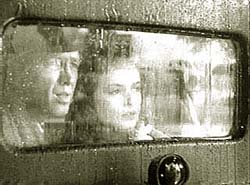
Left to right (apologies for the photo quality)
Mark Levin, festival juror
Alan Berliner. Entry: Wide Awake
Henry-Alex Rubin, festival juror, director
MurderballSteven Cantor. Entries: What Remains; loudQUIETloud.
Freida Lee Mock. Entry: Wrestling with Angels: Playwright Tony Kushner
Saturday morning's discussion was another filmmaker free-for-all: how they did it, why chose/how they approached the subject, and a variety of other project-specific questions and answers. But the most interesting discussion followed
Danny Schechter's comment (thinly disguised as a question), what are we going to do about the way we're not getting the facts from any media anymore? Schechter's
In Debt We Trust showed at the festival.
For some filmmakers, the first answer was "nothing." And I agreed with them. If you choose a story, the politics are implied. The story, the shots, the editing, the music; that's the politics. Cantor's movie about the Pixie's reunion, sort-of, tour is about something else. Even Mock's movie of Tony Kushner, a loud political playwright, is a movie about Kushner the artist. But Schechter point, and Schechter, wouldn't go away.
Schechter said, for instance, that he and his partners get a lot of letters saying that their movies are good, but "not for us." If news media and government are not reliable source of fact, and movies that expose the facts are "not for" lots of distributors, what will we do as filmmakers to address the structural deafness in the populace? The old dichotomy between art and reporting poked into view almost immediately. Art's view is deep, particular, and sensual. Reporting's view is short, cold, hard, and oppositional.
Alan Berliner challenged Schechter to start a Not For Us festival to get artistic reporting into the open. Schechter in turn challenged filmmakers and viewers to take responsibility for their piece of the film making/media-making industry. Levin and Schechter agreed that the internet pay-for-priority legislation being considered now may screw filmmakers and that it is a responsibility to act. Here's an example of the effect: ABC shows could download like water over Niagra (if they paid for priority data traffic); Fred's Films movie trailer download could take all morning (if Fred didn't pay for fast data traffic).
I'm getting ahead of myself, but
Jay Craven said, (not quoting but interpreting the ideas I digested), When you write the story, the theme perks out of behavior, action, juxtaposition, and spoken words. But the writer is responsible. He's got to watch theme emerge, compare it with his goals, deepen it where it's what he means, adjust where it doesn't. So many entertaining movies aren't about anything (my strong impression). It's just interesting people doing interesting things. I like many of them. But there's more.
Schechter seemed to be urging filmmakers to go beyond treating film as a commodity - artistic or otherwise. During the Friday Coffee with... event, two documentary filmmakers were very reluctant to hope or insist that their movies could change the structure of the way turtles or autistic people, respectively, might be treated. Okay, so they had just locked the festival edit, they didn't set out to make a movie about political change, they were unprepared to organize for the cause. Forgiven. But their movies are about people with problems that demand a response. Schechter was right at least this far. Stand up. Say that you want the movie to move society toward a better tomorrow. We're Davids in a Goliath kind of world - hard, cold, competitive Davids. This art should kick some ass.
Thanks, Danny.












